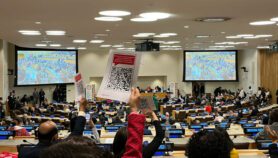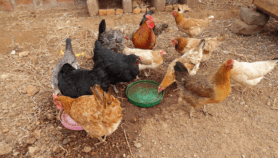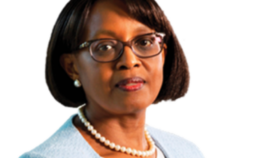13/01/21
COVID-19 hits incomes across key African economies

Send to a friend
The details you provide on this page will not be used to send unsolicited email, and will not be sold to a 3rd party. See privacy policy.
[NAIROBI] COVID-19 is wreaking havoc on the emotional wellbeing and financial stability of Africans, signalling the need for policymakers to boost the employment of people working in the informal sector, a report says.
According to the report resulting from a survey in six African countries — Cote d’Ivoire, Democratic Republic of Congo, Kenya, Mozambique, Nigeria and South Africa — COVID-19 has led to reduced incomes of over three quarters of the population, with Kenyans hit particularly hard from continued lockdown.
The survey, conducted in November last year, is one of a series conducted by GeoPoll on the impact of COVID-19 in Sub-Saharan Africa.
“In this current study, 79 per cent reported that their income continues to decrease even since June 2020.”
Roxana Elliott, GeoPoll
“Our study over the summer found that 76 per cent had reported a decrease in income and in this current study, 79 per cent reported that their income continues to decrease even since June 2020,” says Roxana Elliott, vice-president of marketing for GeoPoll.
“We also find that those whose lives have been affected the most by COVID-19 report more mental health struggles – in Kenya and South Africa, which have both been at times under widespread restrictions. About a quarter of respondents say they feel much worse emotionally than before COVID-19,” she adds.
According to the report released last month, researchers sampled 3,000 people of ages ranging from 15-35 years old in the six African countries, with each country having 500 respondents.
Elliott adds that the study focused on those six African countries because they represent major population areas and are economic centres in East, Central, Southern and West Africa.
She tells SciDev.Net that despite a decline in COVID-19 cases in some African countries, many households are still suffering financially, emotionally and mentally – with income decreases being high in Kenya and Mozambique.
But the study suggests there is optimism that lives may return to normal and economic situations will improve in 2021, with 65 per cent of respondents hoping that their personal finances will pick up.
“This hopefulness is spurred by the [possible] arrival of a vaccine. In the countries that have felt the largest impacts from COVID-19, close to 70 per cent of respondents are likely to take a vaccine as soon as possible,” Elliott tells SciDev.Net.
Martin Owino Omedo, regional monitoring, evaluation and learning manager for Africa at Abt Associates, an organisation that uses data to improve the quality of people’s lives worldwide, tells SciDev.Net that the COVID-19 pandemic has exposed weaknesses in economic, health and governance systems in Sub-Saharan Africa countries and the rest of the world.
He says it is a wakeup call for policymakers to improve employment in the informal sector, which contributes to 80 per cent of employment in the region. The informal sector is made up of people who are self-employed and are not usually on payrolls such as retail traders and smallholder farmers.
“It [the report] provides a great policy narrative around making robust our informal employment structures and building social safety nets in case of such a circumstance occurring again, and the opportunity to look into the integration of the mental health system into the broader health system,” he tells SciDev.Net
“Vaccination is the only scientific and ethical way we can achieve herd immunity or bring the cases to acceptable background level or to shut down the circulation of the virus altogether,” he adds.
Mojisola Oluwasanu, a lecturer at the Department of Health Promotion and Education, University of Ibadan, Nigeria, says that even though the method the researchers used in obtaining information is valid, it may not be a complete reflection as it may not reach the low literate population, often more vulnerable to COVID-19 impacts.
“Essentially this report is a call to governments to develop interventions for life post-COVID,” she adds. “Of importance is the theme on trust in information and vaccine acceptance, which is the next major agenda in the fight against COVID-19 in Nigeria and other African countries.”
This piece was produced by SciDev.Net’s Sub-Saharan Africa English desk.













